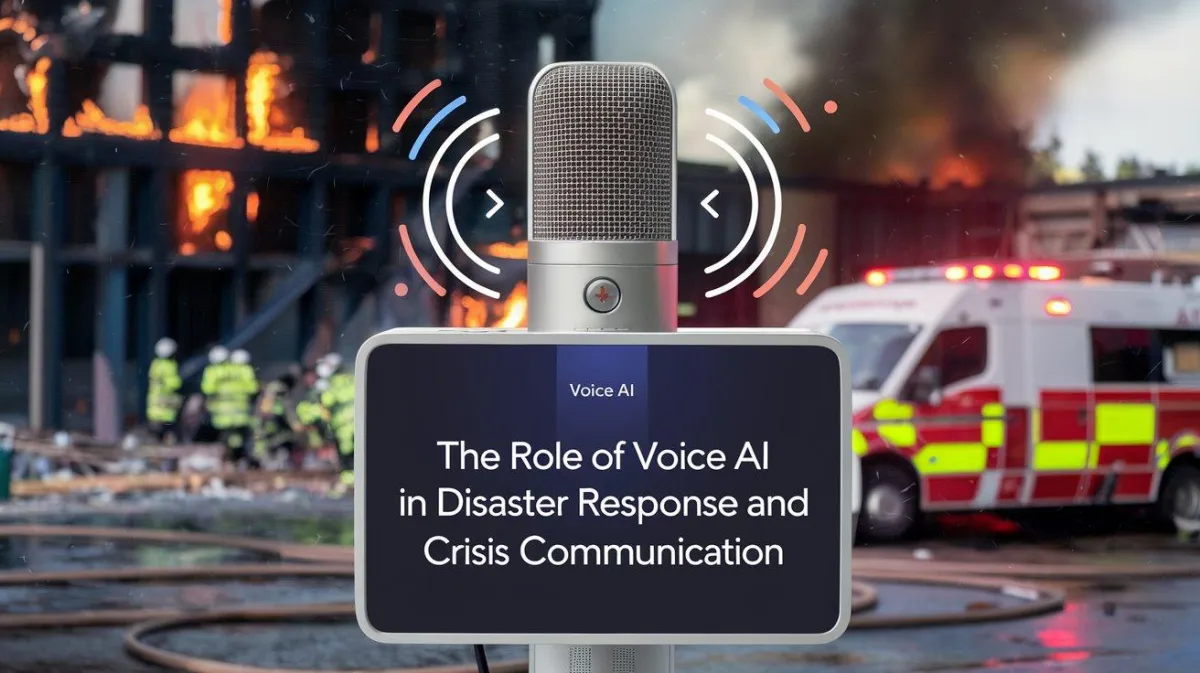
The Role of Voice AI in Disaster Response and Crisis Communication
The Role of Voice AI in Disaster Response and Crisis Communication
In times of crisis, effective communication is vital. Whether it’s a natural disaster, a public health emergency, or a large-scale evacuation, governments and NGOs need to act quickly to disseminate critical information and respond to public inquiries.
Voice AI is emerging as a powerful tool for managing these challenges. By automating communication, providing real-time updates, and streamlining the flow of information, voice AI helps agencies respond more effectively and efficiently during emergencies.
Distributing Critical Information
Voice AI can serve as an always-available communication channel for delivering timely and accurate updates during a crisis. Governments and NGOs can use AI-driven voice systems to:
Broadcast evacuation orders and safety instructions.
Provide real-time weather or disaster updates.
Share details about relief efforts and resources, such as shelter locations or medical assistance.
For instance, residents in an affected area could call a dedicated hotline and receive automated updates tailored to their specific location and needs.
Handling High Volumes of Inquiries
During a disaster, call centers and helplines often become overwhelmed with inquiries. Voice AI can handle these high volumes efficiently by automating responses to frequently asked questions, such as:
“Where is the nearest shelter?”
“How can I access food and water supplies?”
“What are the road conditions in my area?”
This automation reduces wait times, alleviates pressure on human operators, and ensures that more people receive the help they need faster.
Multilingual Support for Diverse Communities
Emergencies often affect diverse populations, many of whom may not speak the same language. Voice AI can bridge this gap by providing multilingual support, enabling governments and NGOs to communicate with people in their preferred language.
For example, voice AI can:
Translate safety instructions in real time.
Offer localized information in multiple languages.
Ensure no one is left out of critical communication efforts.
This inclusivity strengthens community resilience and ensures that vital information reaches everyone.
Streamlining Relief Coordination
Voice AI can also assist in coordinating relief efforts by:
Managing volunteer registrations.
Streamlining donation inquiries and processes.
Tracking resource availability and distribution.
For instance, a voice AI system could handle calls from volunteers, directing them to appropriate relief efforts based on their location and skills. This automation ensures that resources and manpower are deployed where they’re needed most.

Proactive Alerts and Notifications
In addition to responding to inquiries, voice AI can proactively alert citizens about:
Imminent threats, such as severe weather warnings or evacuation notices.
Changes in emergency protocols or routes.
Updates on disaster recovery progress.
By delivering these alerts through voice calls or messages, agencies can ensure that critical information reaches people even if they don’t have access to the internet or social media.
Gathering Feedback and Assessing Needs
Voice AI can help governments and NGOs collect feedback from affected populations to better understand their needs and improve response efforts. For example:
Automated surveys can gauge satisfaction with relief efforts.
Feedback can identify gaps in services, such as insufficient shelter capacity or food distribution issues.
Insights can guide future planning and resource allocation.
This data-driven approach enables agencies to respond more effectively and adapt to evolving situations.
Ensuring Data Security and Privacy
Handling sensitive information during emergencies requires robust security measures. Voice AI systems can be designed to comply with strict data protection standards, ensuring that personal and location data remain confidential.
By safeguarding this information, agencies can build trust with the communities they serve, which is crucial during a crisis.
Conclusion
Voice AI is transforming disaster response and crisis communication by enabling governments and NGOs to deliver critical information, manage inquiries, and coordinate relief efforts more effectively. With its ability to handle high call volumes, provide multilingual support, and gather actionable feedback, voice AI empowers agencies to save lives and mitigate the impact of emergencies.
As technology continues to evolve, the role of voice AI in disaster management will only grow, offering new ways to protect and support communities when they need it most.
STAY UPDATED
Sign up to be the first to find out when we add new languages, new bots, new capablities, and more. We respect your privacy and will never share your information with any third-party vendors.
Sign up to be the first to find
out when we add new
languages, new bots, new
capablities, and more. We
respect your privacy and will
never share your information
with any third-party vendors.




